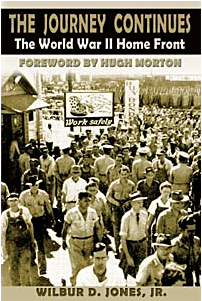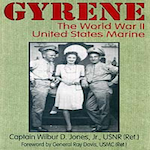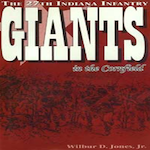Winner, 2003 Willie Parker Peace Book Award
North Carolina Society of Historians
“This is an exceptionally well-researched, well-written book that has an eminently readable style. It does a superb job of elevating the importance of the WWII years and the effect the war had on Wilmington and its people from economics to lifestyle. It is a very entertaining book that is proficient in educating while entertaining.
“The author’s choice of content is genuinely remarkable, he knowing exactly when to include important details and when to be concise. Mr. Jones’ choice of illustrations, photographs, period jokes and advertisements; the fear, stress and harsh living conditions of Wilmington’s inhabitants; the helpful chapter notes and footnotes; the ‘thoughtful’ glossary, bibliography and extensive index…goes way beyond remarkable. It is the perfect book for a researcher, genealogical or historical, and no library should be without it. One of the finest entries we have had the pleasure to judge.â€
“Wilbur Jones, one of our finer military authors, has portrayed the enormous contribution of one small city and its sacrifice in human treasure…a real trip down Memory Laneâ€
Leon Uris, author of Battle Cry, Exodus, Trinity; WWII Marine
WILMINGTON
The population, economic, cultural, and social hub of Southeastern North Carolina – a mighty contributor to the war effort in World War II.
* The “Defense Capital of the State”
* The country’s unique wartime boomtown
A Sentimental Journey is a social history of the life and culture on the Wilmington and Southeastern North Carolina home front. The personal story of a burgeoning community, it is the first book covering a specific geographic area this extensively.
The author, born and raised in Wilmington and seven when the war began, weaves the story through interviews, letters, memoirs, the local daily newspapers, and other accounts. His vivid boyhood remembrances are the thread.
The area had all the armed forces stationed in large numbers, a shipyard producing 243 cargo vessels, the vital state port, industries at capacity, and German prisoner of war camps. Thousands left to fight; 191 New Hanover County boys died. Two high school graduates received the Medal of Honor. Strategically located, it endured constant civilian defense drills and restrictions, U-boats sinking ships offshore (one fired on a defense plant), and until 1944, the threat of attack.
The population nearly tripled. Demands for goods and services including housing, schools, food, and recreation overwhelmed. Officials struggled to manage the social, civic, jurisdictional, racial, and governmental complexities during the city’s economic heyday – while handling huge construction projects, war workers, citizen stresses, black markets, a crime wave, equal justice, and weekend hordes of soldiers.
All the while, people fell in love, social life whirred, and the seed of Wilmington spread throughout the land. As the war neared its end, and military personnel and industrial requirements were disappearing, the area retreated to its pre-war small-town seclusiveness. By 1946, the bell-curve joyride was over.
WWII home-front books tend to be generic or subject-specific. Journey is a personal community history, linked and interpreted by the author’s own vivid remembrances and conclusions of a schoolboy growing up there during the war. His world also turned upside down, strongly influenced by the war news, directing him and his friends into continuous fantasy war games against the enemy, collecting precious artifacts and memorabilia, and idolizing neighbors in uniform.
Chapters also include vignettes and anecdotes on Negro life and contributions to the war effort; women’s roles in the war effort; morale; crime and law and order; school and neighborhood life; restrictions and hardships; and the impact of area residents in the Armed Forces. An Index, Bibliography, and Glossary are included.
Others say:
“I so appreciate the work Wilbur Jones has done to re-live and express his story and the stories of so many others [which] lives on forever in our heartsâ€
– Linda Lavin, Tony Award winning actress
“Jones has left no stone unturned in writing this provocative and heart-warming account of…my sleepy hometown…â€
– Percy Heath, jazz musician; WWII Tuskegee Airman
“Journey [offers] an interesting portrait to readers not only from Wilmington but to anyone who might have been affected by any war.â€
– Winston-Salem (N. C.) Journal
“Jones gives us an interesting view into…the triumphs and challenges for a hometown during time of war.â€
– Seapower Magazine, Navy League of the United States
“A vivid re-creation of the social life of North Carolina’s port city….Fast-paced, personal, and lively [about] a dynamic center of industrial and military activityâ€
– Jeffrey J. Crow, Deputy Secretary, Office of Archives and History, North Carolina Department of Cultural Resources
“The epic of the American home front in meticulous detail….It’s all here…the rest of the story.â€
– Ben Steelman, Wilmington (N. C.) Star-News
“Jones’ loving reminiscence of the place I live today has made it so real I could swear I was here at the time he writes aboutâ€














